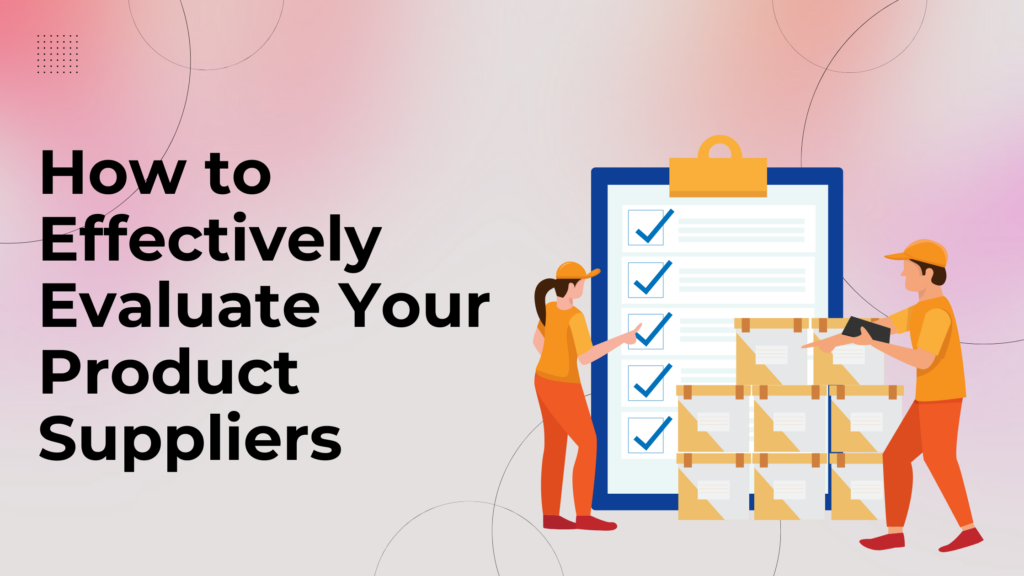How to Effectively Evaluate Your Product Suppliers
In the competitive landscape of business, evaluating your product suppliers is crucial for maintaining a strong supply chain and ensuring the success of your company. The evaluation process allows you to assess suppliers based on various factors such as quality, cost, delivery, service, communication, and innovation.
By regularly evaluating your suppliers, you can identify areas for improvement, minimize risks, streamline operations, and ultimately enhance the overall performance of your business. In this comprehensive guide, we will delve into the key steps involved in evaluating suppliers effectively, providing you with a framework to develop criteria and processes that yield actionable insights.
Content
The Importance of Evaluating Suppliers
Setting Up a Vendor Evaluation System
Key Factors to Assess in Supplier Evaluation
Best Practices for a Successful Supplier Evaluation
The Value of Smart Supplier Evaluations
The Importance of Evaluating Suppliers
A robust supplier evaluation process is essential for building a successful and sustainable business. It enables you to establish close working relationships with your suppliers, optimize production timelines, reduce operating costs, and ensure the quality of your products. Regular evaluations help identify inefficiencies, uncover growth opportunities, and reinforce relationships with suppliers. These evaluations are based on both quantitative metrics and qualitative observations, providing a holistic assessment of supplier performance.
Setting Up a Vendor Evaluation System
To ensure a comprehensive evaluation, it is important to establish a vendor evaluation system that can be applied consistently to all suppliers. This system should go beyond vetting new vendors and also include regular evaluations of existing suppliers. By consistently evaluating suppliers using predefined categories and rankings, you can identify both strong and weak areas within your supply chain.
Even if your company has a limited number of suppliers, evaluations can help prioritize suppliers and identify potential risk areas. The ultimate goal of the system is to track vendor performance consistently and incorporate the evaluation data into the purchasing process.
Defining Key Performance Indicators (KPIs)
An effective vendor evaluation system should include clear KPIs and metrics aligned with your company’s priorities. These metrics should provide a comprehensive view of supplier performance and highlight any red flags indicating a failure to meet standards. Procurers should rate suppliers each time they are used, and feedback should be submitted within specified deadlines. Adopting a numerical evaluation system simplifies the ranking of companies based on their performance scores. It is crucial to agree on the evaluation criteria and metrics with your vendors to ensure alignment and enable them to provide feedback and suggestions for improvement.
Common Mistakes in Vendor Evaluation Systems
While implementing a vendor evaluation system, it is important to avoid common mistakes that can undermine the effectiveness of the process. Some common pitfalls include inconsistent use of agreed-upon KPIs and metrics, failure to provide regular feedback to suppliers on their performance, disregarding supplier feedback in discussions and decision-making, and using confusing or ambiguous metrics and KPIs. By addressing these challenges, you can ensure that your vendor evaluation system remains robust and yields actionable insights.
Key Factors to Assess in Supplier Evaluation
When evaluating suppliers, it is important to consider various factors to gain a comprehensive understanding of their capabilities and suitability for your business. While the specific evaluation criteria may vary across industries, there are several key factors that every company should assess:
Production Capacity
A thorough assessment of a supplier’s production capacity is crucial to determine their ability to meet your production cycles and scale production as needed. A supplier that cannot keep up with your demand or lacks the necessary resources may hinder your operations and lead to delays or inefficiencies.
Quality
Assessing the quality of a supplier’s products is essential to ensure that they meet your standards and expectations. ISO BS/EN ISO 9001:2000 certification is widely recognized as an industry standard for quality management. It assures that the supplier excels in areas such as management responsibility, resource management, product realization, measurement, analysis, and improvement.
Performance
Evaluating a supplier’s performance involves assessing their track record and experience in handling similar projects or clients. Previous experiences, references from other clients, and advancements in product development or process improvement are all valuable indicators of a supplier’s ability to meet your requirements.
Risk
Every business faces various risks, and suppliers should actively work to minimize these risks throughout the supply chain. Evaluating performance metrics such as overall delays, average response time, and corrective actions can help you assess the level of risk posed by a particular supplier and make informed decisions to mitigate those risks.
Environmental Impact
Sustainability is increasingly important for businesses, both from a financial and ethical standpoint. Evaluating a supplier’s environmental impact involves assessing their waste management strategies, efforts to reduce waste, material procurement procedures, energy efficiency initiatives, and protocols for handling harmful materials. By partnering with suppliers committed to sustainability, you can align your business with environmental goals and enhance your brand reputation.
Best Practices for a Successful Supplier Evaluation
While it is crucial to identify the criteria for evaluating suppliers, it is equally important to follow best practices to ensure the success of the evaluation process. By adhering to the following guidelines, you can maintain focus and obtain accurate and meaningful insights:
Outline a Schedule
Establish a clear schedule that outlines the tasks and deadlines for the evaluation process. This ensures that everyone involved understands their responsibilities and can complete the evaluation accurately and on time.
Prepare a Detailed Questionnaire
Provide your suppliers with a concise yet comprehensive questionnaire at the beginning of the evaluation process. The questionnaire should include factual and subjective questions that solicit necessary information. Avoid including questions that suppliers may not be able to answer. This questionnaire will serve as a valuable tool for collecting data and gaining insights into supplier capabilities.
Conduct On-Site Visits
Where feasible, schedule on-site visits to your suppliers’ facilities. This will enable you to validate the information gathered from the questionnaire and gain additional insights into the supplier’s operations. During the visit, review the supplier’s quality control strategies, assess the condition of their equipment, and evaluate the technical competence of their workforce. On-site visits also provide an opportunity to build stronger relationships with suppliers.
Involve the Right Stakeholders
Ensure that key stakeholders, such as the chief financial or revenue officer and senior members of the procurement department, participate in the evaluation process. Their expertise and insights will contribute to a comprehensive assessment of supplier performance.
Foster Positive Relationships
Maintaining strong relationships with your suppliers is essential for productive collaboration. Acknowledge and congratulate suppliers who consistently perform well, and provide constructive feedback and guidance to suppliers who may be falling short. Building a supportive and collaborative relationship will encourage suppliers to improve their performance and contribute to the success of your business.
The Value of Smart Supplier Evaluations
Regular supplier evaluations are a valuable tool for businesses, providing insights that can drive operational improvements, minimize risks, streamline production timelines, reduce costs, and enhance supplier performance. By adopting a systematic approach to supplier evaluation and consistently applying predefined criteria and metrics, businesses can better understand their strengths and weaknesses, identify growth opportunities, and build stronger relationships with their suppliers. Comprehensive supplier evaluations empower businesses to make informed decisions, drive efficiency, and ensure the long-term success of their supply chain.
Final Words
In conclusion, evaluating suppliers effectively is crucial for building a successful and sustainable business. By setting up a vendor evaluation system, defining key performance indicators, assessing critical factors, and following best practices, businesses can gather actionable insights and make informed decisions to optimize their supply chain. Regular supplier evaluations pave the way for enhanced collaboration, improved performance, and a competitive edge in the marketplace. Embrace the power of supplier evaluations to drive your business towards success.





